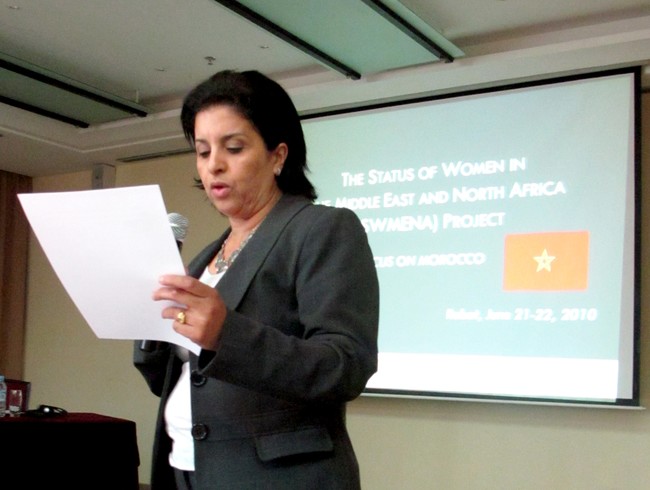
By: Suzanne Abdullah
In June, I traveled to Morocco with the Status of Women in the Middle East and North Africa (SWMENA) project team. SWMENA is an innovative, regional project that uses scientific surveys to gather data on various aspects of women’s status, and then use this data —as well as tools to maximize its use—to assist local NGOs in conducting advocacy campaigns to improve the status of women in their countries. The purpose of this trip was to release IFES’ Morocco survey findings to women’s rights advocates, and generate policy recommendations based on these findings. While I am always impressed with the people I meet on my trips with IFES – both in civil society and government – I have never been so amazed by a single individual working so passionately to change her country for the better.
Throughout my time in Morocco I had the privilege of working with Fatima Outaleb, a founding member of the Union de l'Action Feminine (UAF), a group that promotes women’s social and legal status in Morocco and aims to remove all types of discrimination and violence against women. I had met Fatima previously and knew she was committed to promoting women’s rights in Morocco – she had, after all, been working pro-bono for us bestowing invaluable advice in the weeks leading up to our workshop. Yet watching her in action during this trip allowed me to witness one of those special individuals who have the energy and the charisma to make a huge impact on the causes they promote.
We arrived in Rabat just a few days before the event to find that Fatima had lined up a highly-energetic group to participate in the workshop. A member of parliament would moderate the first day of the workshop and a well respected gender expert the second day. These two high-profile figures were only the first component of a stellar group. Fatima had also gathered participants from all sectors of civil society and government, including several representatives from the Ministries of Finance, Youth and Education. A number of participants traveled from Casablanca and Tangiers to take part in our session, and even a handful of men attended, a rarity in our SWMENA events. Not only did these advocates attend the workshop, they actively participated, drawing on their vast experience and insight to provide constructive criticism to help improve the project, as well as make in depth recommendations based on our data findings to improve women’s status in Morocco. It was one of the most fruitful workshops I’ve attended. Fatima had clearly put in an enormous amount of time, effort and energy in pulling this together, and it was very much evident in the success of the event.
I was even more impressed to learn that Fatima largely volunteers for UAF – she works primarily as a school teacher throughout the year. It’s not surprising, then, that one of Fatima’s policy recommendations emanating from our data was to work towards reforming education policy to be more inclusive in order to combat illiteracy. According to the IFES questionnaire, 48% of women surveyed have no formal education, compared with 23% of men. Fortunately, however, educational attainment seems to be improving in Morocco – 87% of women 65 or older have no formal education, compared to only 16% of women 18 to 24 years of age. As a teacher, I am certain Fatima has contributed to this success.
IFES works with activists like Fatima all around the world, and it’s easy sometimes to forget what a privilege this is. I felt incredibly rejuvenated at the end of this trip – I felt the impact and importance of our work and was reminded of what drew me to the field of development in the first place – to support impassioned people like Fatima who are determined to make a positive difference in their societies.
- A Rape Case in Tunisia puts the Legal System on Trial
- Women: Another Casualty of Egypt’s Draft Constitution
- Call for Communication to the UN Commission on the Status of Women
- Resources
- SWMENA data used in research
- IFES Releases Data on the Status of Women in Egypt and Tunisia
- SWMENA Conducts Regional Lessons Learned
- SWMENA Featured in Interaction Monday Developments
- IFES Congratulates the 2011 Nobel Peace Prize Laureates
- Public Opinion Data and Political and Legal Reform Opportunities for Women in Yemen, Morocco and Leb
- New Challenges, Opportunities for Women’s Political Participation in the Middle East
- Women Count
- Infographics Help Advocacy Efforts for Women
- MENA Protests Could Help Advance Women’s Rights
- Popular Protests Pave Way for Women’s Rights in Yemen
- Observing International Women’s Day
- IFES Releases Paper on the Use of Gender Quotas in the Arab World
- Collaborating with Visionaries to Improve the Status of Women in Morocco
- Status of Women in the Middle East and North Africa
- Lobby Training Manuals for Activists
